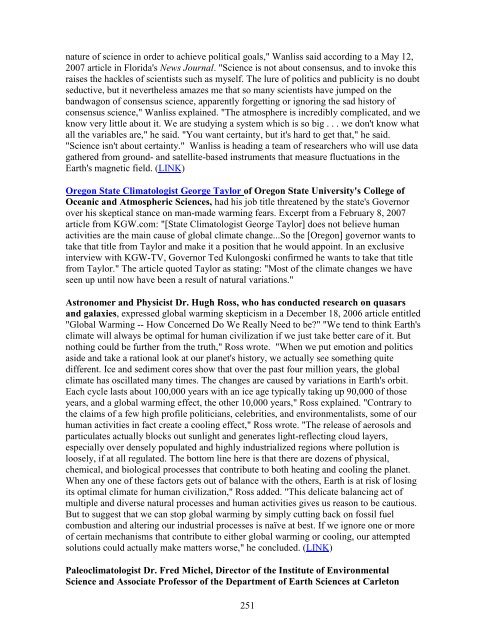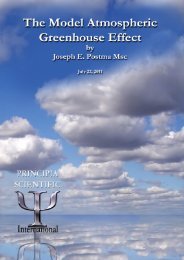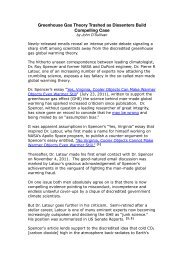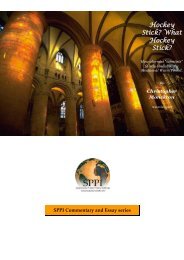Than 1000 International Scientists Dissent Over Man-Made Global ...
Than 1000 International Scientists Dissent Over Man-Made Global ...
Than 1000 International Scientists Dissent Over Man-Made Global ...
Create successful ePaper yourself
Turn your PDF publications into a flip-book with our unique Google optimized e-Paper software.
nature of science in order to achieve political goals," Wanliss said according to a May 12,<br />
2007 article in Florida's News Journal. "Science is not about consensus, and to invoke this<br />
raises the hackles of scientists such as myself. The lure of politics and publicity is no doubt<br />
seductive, but it nevertheless amazes me that so many scientists have jumped on the<br />
bandwagon of consensus science, apparently forgetting or ignoring the sad history of<br />
consensus science," Wanliss explained. "The atmosphere is incredibly complicated, and we<br />
know very little about it. We are studying a system which is so big . . . we don't know what<br />
all the variables are," he said. "You want certainty, but it's hard to get that," he said.<br />
"Science isn't about certainty." Wanliss is heading a team of researchers who will use data<br />
gathered from ground- and satellite-based instruments that measure fluctuations in the<br />
Earth's magnetic field. (LINK)<br />
Oregon State Climatologist George Taylor of Oregon State University's College of<br />
Oceanic and Atmospheric Sciences, had his job title threatened by the state's Governor<br />
over his skeptical stance on man-made warming fears. Excerpt from a February 8, 2007<br />
article from KGW.com: "[State Climatologist George Taylor] does not believe human<br />
activities are the main cause of global climate change...So the [Oregon] governor wants to<br />
take that title from Taylor and make it a position that he would appoint. In an exclusive<br />
interview with KGW-TV, Governor Ted Kulongoski confirmed he wants to take that title<br />
from Taylor." The article quoted Taylor as stating: "Most of the climate changes we have<br />
seen up until now have been a result of natural variations."<br />
Astronomer and Physicist Dr. Hugh Ross, who has conducted research on quasars<br />
and galaxies, expressed global warming skepticism in a December 18, 2006 article entitled<br />
"<strong>Global</strong> Warming -- How Concerned Do We Really Need to be?" "We tend to think Earth's<br />
climate will always be optimal for human civilization if we just take better care of it. But<br />
nothing could be further from the truth," Ross wrote. "When we put emotion and politics<br />
aside and take a rational look at our planet's history, we actually see something quite<br />
different. Ice and sediment cores show that over the past four million years, the global<br />
climate has oscillated many times. The changes are caused by variations in Earth's orbit.<br />
Each cycle lasts about 100,000 years with an ice age typically taking up 90,000 of those<br />
years, and a global warming effect, the other 10,000 years," Ross explained. "Contrary to<br />
the claims of a few high profile politicians, celebrities, and environmentalists, some of our<br />
human activities in fact create a cooling effect," Ross wrote. "The release of aerosols and<br />
particulates actually blocks out sunlight and generates light-reflecting cloud layers,<br />
especially over densely populated and highly industrialized regions where pollution is<br />
loosely, if at all regulated. The bottom line here is that there are dozens of physical,<br />
chemical, and biological processes that contribute to both heating and cooling the planet.<br />
When any one of these factors gets out of balance with the others, Earth is at risk of losing<br />
its optimal climate for human civilization," Ross added. "This delicate balancing act of<br />
multiple and diverse natural processes and human activities gives us reason to be cautious.<br />
But to suggest that we can stop global warming by simply cutting back on fossil fuel<br />
combustion and altering our industrial processes is naïve at best. If we ignore one or more<br />
of certain mechanisms that contribute to either global warming or cooling, our attempted<br />
solutions could actually make matters worse," he concluded. (LINK)<br />
Paleoclimatologist Dr. Fred Michel, Director of the Institute of Environmental<br />
Science and Associate Professor of the Department of Earth Sciences at Carleton<br />
251





